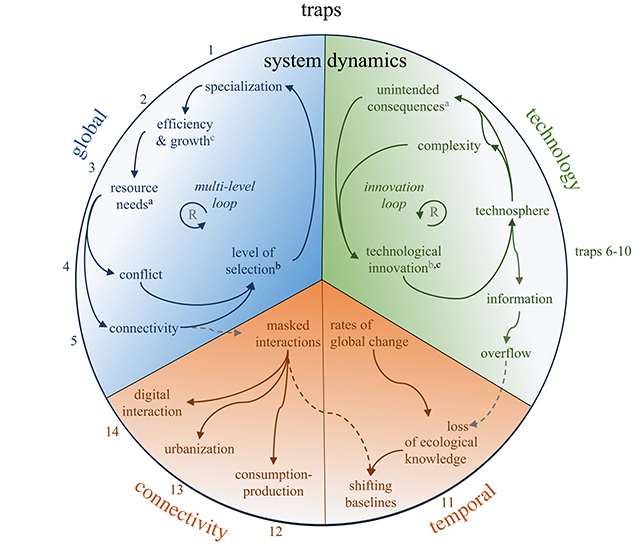Seen through a lens of ongoing technological and medical progress it's easy to feel optimistic about humanity's future prosperity. Scratch a little deeper, it soon becomes clear that our success as a species is anything but guaranteed.
New research led by a team from the University of Stockholm in Sweden outlines 14 different "evolutionary traps" that our global population could potentially be ensnared by, ultimately leading to our demise.
According to the team behind the study, part of the problem is that we've been doing too well for ourselves – our dominance and success is leading to dangerous consequences.
Now we're going through what's known as a polycrisis, where multiple threats – from climate change to global pandemics – are threatening to bring the Anthropocene era to an end sooner rather than later.

"Humans are incredibly creative as a species," says anthropologist Peter Søgaard Jørgensen from the University of Stockholm.
"We are able to innovate and adapt to many circumstances and can cooperate on surprisingly large scales. But these capabilities turn out to have unintentional consequences."
Of the 14 possible evolutionary dead ends for humanity, five are labeled as global: simplification (systems becoming too specialized to adapt, such as monoculture farming), growth-for-growth (a non-stop pursuit of growth harming well-being), overshoot (using more than Earth can provide), division (international conflict), and contagion (infectious diseases, for example).
Another five are described as technology traps. They are infrastructure lock-in (as with fossil fuels), chemical pollution, existential technology (such as nuclear arms), technological autonomy (including AI), and dis/misinformation.
The remaining four are called structural traps by the researchers. These ones are short-termism, overconsumption, biosphere disconnect, and local social capital loss, where an increasingly digital world cuts off social interaction and potentially contributes to further division.
What's more, 12 of these are reckoned to be in an advanced state. Only technological autonomy and local social capital loss have yet to develop into concerning problems. Even more alarmingly, these dead ends tend to reinforce each other, meaning it's likely that we'll get trapped in more than one.
"Evolutionary traps are a well-known concept in the animal world," says Søgaard Jørgensen.
"Just like many insects are attracted by light, an evolutionary reflex that can get them killed in the modern world, humankind is at risk of responding to new phenomena in harmful ways."
It's a pretty bleak picture, but the researchers aren't giving up yet. What's needed now, the team says, is active transformation – not just an acceptance that we must go with the flow, but deliberate efforts in the other direction.
We may be short-sighted and destructive as a species, but we're also creative, innovative and collaborative, the researchers point out. That means there's hope that our fate isn't written yet.
"A very simple thing that everybody can do is to engage more in nature and society while also learning about both the positive and negative global consequences of our own local actions," says Jørgensen.
"There's nothing better than exposing yourself to what needs protecting."
The research has been published in Philosophical Transactions of the Royal Society B.
